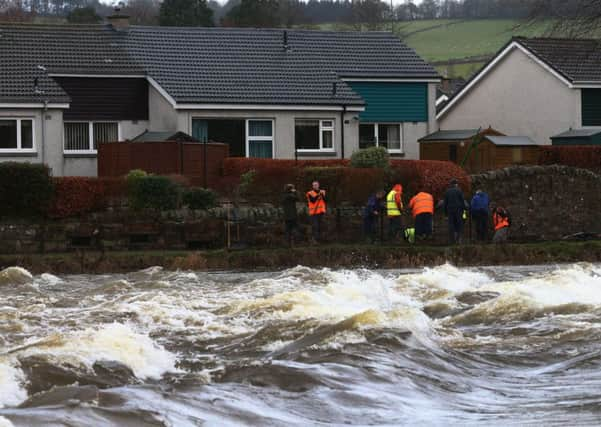Scotland '˜must act' in face of frequent flood disasters


Lord Deben, the chairman of the independent Climate Change committee, issued his warning on a visit to Edinburgh to gather evidence for its research into the impact of global warming.
The head of the statutory body which advises the Scottish and UK Governments outlined a series of changes that have to be make in order to avoid the potentially “disastrous” consequences of climate change.
Advertisement
Hide AdAdvertisement
Hide AdLord Deben called for a radical change to farming methods, better planning legislation to minimise flood damage to buildings as well greater use of electric vehicles in rural areas to cut carbon emissions.
As flood warnings were put in place across Tayside as the region was hit by heavy rain and snow melt, Lord Deben said: “The fact is that we have already changed the climate sufficiently to be able to say that we are going to get much more extreme weather much more frequently. That is because normal weather occurrences are made more extreme by the fact that temperature is higher. So the floods that we have had both in Scotland and largely in the north of England we are going to have to recognise are likely to be a much more frequent part of our experience.”
To minimise the effect of flooding, Lord Deben said farming methods needed to change so that there was less use of heavy machinery, which compressed agricultural land leading to the acceleration of rainfall into rivers.
“We have over the last 50 years used much bigger machinery on our arable fields, of which there are many in Scotland. It has compacted the land. We have drained a lot more. Water therefore doesn’t sink into the ground and go on to the aquifers. It slides off the top and goes into the rivers very quickly. There are real issues about how we should tackle that,” Lord Deben said.
Among the suggestions made by Lord Deben, who was an environment minister in John Major’s govgovernment, was the use of balloon tyres should be adopted to spread the weight of machinery.
More use of new drilling techniques to treat soil would reduce the need for ploughing, while GPS technology can be used to ration the use of machinery to spread fertiliser by identifying areas of land most in need of treatment.
Lord Deben said the impact of building projects on flood plains had to be understood.
“There is building on unsuitable places,” he said. The thing about building on flood plains, it is not just that they are vulnerable to flooding, but they reduce the land that is supposed to take the floods. The flood plain is doubly assaulted. First you put a house on it and not surprisingly it gets flooded. Secondly the flood plain is not there to absorb the water for elsewhere, so very often that affects other people.”
Advertisement
Hide AdAdvertisement
Hide AdLord Deben acknowledged that the rural nature of much of Scotland led to specific challenges when it came to reducing the greenhouse gas emissions caused by motoring.
His solution was to persuade people to shift from the internal combustion engine to electric cars in due course, citing the latest American technology which has seen the development of electric vehicles capable of travelling 200 miles before requiring a recharge.
“We are almost there,” Lord Deben said. “The moment you have got that [electric car technology] then people choosing electric cars will be the big difference as long as we decarbonise electricity.
“Transport is different in Scotland. You have much bigger areas and there is much greater difficulty in providing public transport. There is a real issue about private motoring and how you reduce that. It becomes even more important for us to have a decarbonised system where we drive electric cars.”
Meeting Lord Deben’s committee yesterday was Aileen MacLeod, Scotland’s climate change minister, who faced questions about a 10 per cent cut to the climate change budget – a reduction in cash, which has been criticised by environment campaigners.
In October last year, Dr McLeod told parliament: “We will ensure that climate change is a top priority through a cabinet agreement to embed it in the autumn budget process”.
However, Scottish Government figures show spending on measures aimed at reducing domestic greenhouse gas emissions will be reduced from £502 million in 2015-16, to £456.2m in the 2016-17 draft budget.
Lang Banks, director of WWF Scotland, said: “With the Paris conference having demonstrated increased international commitment to tackling climate change, we should be stepping up our action.”